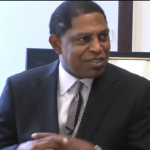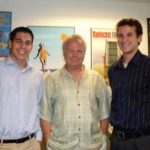Interview: How To Become a Writer
David Rensin is the author of twelve books, the most recent being a slice of Americana in the biography of Miki Dora.
How would you describe your job.
How would I describe my job? Basically, as gainful unemployment. My job really is…I write books. That’s the simple explanation. I interview people. I use that as an excuse to go out and have different experiences in life.
My promise to myself in high school was to never have a job. And I’ve been largely successful.
But what I really am is an empath machine- like a tube of rigatoni- the information goes in one end and out the other, somehow modified by me. Sounds crazy, but that’s what I do. I go out and connect with people, and for some reason, it just comes naturally.
I put what they say down on paper as they said it.
What’s the most challenging part of that whole process?
The most challenging part of being an author is starting over…again and again and again. I really love the process. But you really have to overcome a lot of inertia. Or at least I do.
My last project took me four years. It wears you out. It’s like taking four or five years to have a baby. That’s a little bit much. Like a baby, you forget the pain after awhile, and then you can have another one. Otherwise, everyone would only have one kid.
Starting over again, gearing up. The more you do it, the more you know how much work is involved. That’s a little daunting. The doing it, that’s the fun. The process is like riding a wave. You don’t know what’s coming and you just use all of your innate skills to make it happen. There are challenges along the way. That challenge and not giving up to go pump gas.
What gives you the most enjoyment?
I try to get enjoyment all through the process. It’s really hard to pinpoint. I enjoy being independent and not having to go to work. I enjoy meeting the people. I enjoy solitary work at my computer editing voices. I enjoy the challenge of writing more and more when I do stuff. I enjoy the strategy of when you’re interviewing three hundred people. It’s just all a big puzzle. I just enjoy being involved and not being bored.
On a scale of 1-10, 1 being no time and 10 being every waning second of your life, how much of your time is spent actually related to work?
That’s really an interesting question. And it’s less than you would imagine. I want to say seven, but it might be six and a half. But of course I make the case that “related to work” might be doing interviews, writing the books, traveling, etc. But frankly, I would count showers as part of work. A lot of good ideas come to you in the shower. Or just the half an hour before you’re fully awake. So my life could be a hundred percent related to work. Because I’m always thinking. Sitting here talking with you, you say something, I write it down. I wasn’t trying to work. But there it is. I’m involved all the time. I don’t have a writing schedule. I don’t have hours to work. It’s not formal. I know that I have to get up, I know that I have to do the work, I want to do the work. I’m not putting my hair in curlers, eating bon bons, and watching the Home Shopping Network with a Mastercard. Other than that, I don’t give myself any rules except that I have to keep my deadlines.
I really think that what I do, is something that anybody can try. It’s not that daunting. I started out with no experience. Just a passion for wanting to meet girls and go to concerts for free. It doesn’t matter what it is. You have to get into the mix. You have to get out on the streets. You can stay inside.
When I started my career in 1969 in college reviewing a concert for free, I wanted to go see as much music as possible. I could write, so I did that. I followed my passion.
So if you have a passion to talk to people, write about it, express your thoughts, or just be a novelist, which you don’t have talk to anybody, then that gets you there. You can easily give yourself a chance in this to see if it works or not.
I also think that in my case, and I’m not trying to be self-aggrandizing, it takes a natural personality. Different personalities fit different jobs. My personality, just luckily, I didn’t figure it out in advance, but way after, my personality fits what I do. So if you’re gregarious and you like to talk to strangers in the supermarket…you know.
I would describe myself as an author who has fun doing a job that doesn’t feel like a job. Doesn’t feel beleaguered.
Why oral history, and why are you passionate about that?
My standard answer, and there is an element of truth, is that I’m lazy. People call me a “writer,” and while I’m not trying to be coy and say I’m not really a writer, because I am. I’ve written all my life. Oral history is like making a documentary between hard covers. I am getting the material, and then I am editing the material. I have a facility for making people’s voices come alive on the page as they sound.
So when you read a book with hundreds of voices, or when you read a book about someone who I collaborated with, it sounds like them. So I have a facility for that. It just seems to be what I naturally like to do.
The story is when I was writing for Rolling Stone at some point in the seventies, I turned in a story. If you know most stories in magazines, there’s three paragraphs of exposition, and a quote to substantiate it. Well, I would do two sentences of exposition and then three quotes to substantiate it. My editor said, “You can’t do that!”
Well, I couldn’t do that there, but clearly I like the sound of people’s voices. I felt like they explain themselves better than I am able to explain them. I don’t really want to tell readers what to think. Certainly there’s a lot of work involved, so the lazy thing doesn’t really apply. But, in fact, I just uh, I don’t uh, you know, I don’t want to tell people what to think. I’d rather they make their own judgments. It’s a harder road, because publishers would rather have you tell readers what to think. Or paint pictures. I paint pictures with other people’s voices.
You did that quite some time with Playboy? How did that opportunity come about?
Well, I wrote for Rolling Stone and all the music magazines in the seventies. I did a couple of stories for Oui magazine. It’s the Playboy offshoot. I did a couple interviews with Brian Wilson from the Beach Boys among other things. My editor went to Playboy when the magazine folded. We had a good relationship. I just started working on the new feature, 20 questions. We just had a lot of fun. We would think of the girls we wanted to date and go interview them. Or some cool guys. Then I would do Playboy interviews. It just naturally rolled into the next. I don’t like to do the same thing over and over again.
If I’d give anybody advice, it’d just be to follow your passion, follow your heart, and be aware of the opportunities that are there to keep evolving. I learned a lot about how to write voices. And how to make internal…structure…sense.
A lot of oral history is not very good because there is no sense about how to edit it. Some people make it to…real. Like it really happened. That doesn’t sound good. Or they make it too structured. There’s just ah talent. It’s just ah “talent,” it’s a skill that I’ve developed.
After awhile you stop thinking about it. And you just do it.
I know that you’ve interviewed thousands of people…
Don’t ask me who my favorite one is.
I’m not, but I was wondering if there is there one that is memorable, crazy, interesting, whatever pops to mind.
Ah geez. I think when you say the most memorable, it diminishes the others. I’ve had the luxury of choosing who I want to interview, and Playboy went along with it. Was Bill Gates memorable? Absolutely. Was Cindy Crawford memorable? Absolutely. She’s a smart woman and she has great legs in cut off jeans. Bill Gates was great, was Martin Scorsese, Jerry Seinfeld, Tom Cruise, memorable? Yeah. Listen, Jack LaLanne was memorable. The guy has more energy in one pectoral muscle than a class full of aerobic dancers. He was really cool. And then he made me work out with him…which was not really cool. Because I’m not nearly up to swimming underneath the water while towing seventy-six boats like he does.
So how do you prepare to talk with these people? What’s the process look like?
In the case of Playboy, I’d say, “Hey, let’s…” Who have I interviewed lately? “Scarlet Johansen! Let’s interview Scarlet Johansen.” They’d say, “Okay, that’s a great idea.” So then I call up Scarlet Johansen’s publicist. And say, “David Rensin, Playboy. I want to interview Scarlet.” The publicist says, “Oh yeah, that’s a great idea.” Or they say, “Are you kidding? Playboy? Reawh.” I’ll sell myself because frankly, I’ve been at this so long that the contacts and publicist people change so often that I have no idea if anyone knows who I am anymore. So I have to say, “Hey, did you read the Mailroom?” It gives you a little bit of validity. Or, if you say you’re from the New York Times, then you have lots of validity.
Then I just go online and assemble clips about Scarlet, for example. They send you a care package of clips. You read that stuff and try to see deeper into it. You think of any crazy kind of questions that you could ask that aren’t just the same questions that have been asked before. I happen to have a list I’ve kept from Playboy that is over seven hundred questions I’ve asked.
Then I prepare. Depending on who it is I’ll make up cards with questions. Just so I remember to attack certain subjects. That’s because, these days, you have less and less time with people. I like more time, because then there is a better product. Sometimes, these days, I’ll just go in and wing it.
Like I’m supposed to go and interview Don Felder from the Eagles in a month, on stage, at the Library. I’m going to read his book, I could write questions, but I know the band. I’ve known the band for years. And I wrote their Hotel California tour book. My name is in the “Thank you’s.” I’ll probably will take three questions on a card and let Don do the talking.
But I prepare. I just try to make sure that the questions are different, and that I listen to what they say. And then, follow up. Based on what they say. Larry King once told me, when I interviewed him for Playboy, now here’s a guy who doesn’t prepare a whole lot, but his pet peeve is people who have questions and they don’t follow up. So he could say, “Yeah, I shot a police man yesterday in Washington D.C.” And the interviewer would ask, “So how do you get your interviews?
The reason I have cards is that, although an interview is a conversation, and you hope for the energy that comes the conversation when you really connect, you as an interviewer do have a responsibility to touch certain points. So if you get in a conversation and you only have a couple hours over lunch, you find out that you haven’t asked six questions. So you’ve got to be able to come back to those questions. You have to know your place.
You have to say…geez, what did I ask Scarlett…something, but it made her pull up her shirt (imitating Scarlett Johansen pulling up her shirt)…she wasn’t facing me, but there was a mirror (Laughs). Oh yes, she had just gone to a doctor to get a test for allergies, and so she showed me the big grid on her back with all the little…so you just have to roll with it, you know?
So you’ve interviewed all these, people, has it affected your life at all?
It certainly put money in the bank.
Like your thought process, the way you live your life, because these are influential people.
You know…eih…probably.
It’s hard to measure, I guess.
It is hard to measure. Sometimes someone will say something and I’ll think it’s a great idea if I think about it. I don’t make friends with most of them. That’s not what the point is, you know. I just try to do something good for them and for me. So it influences my life in the sense that it’s kept me wanting to do it.
In your observations, what separates the people you’ve interviewed for Playboy from the people who have come to Hollywood, had to pack their bags, and move back to Ohio?
A lot of the people I’ve interviewed for Playboy are celebrities. People who have already achieved. The people in the Mailroom, a lot of them achieved as well, in a less public fashion. I talked to them about the days when they weren’t achievers at all. I like talking to regular people a lot more know than I do celebrities. And it’s not because I don’t like the peep…the celebrities. I guess I have in mind that I have to stick to a certain kind of script for magazines that I don’t like. As things get more and more difficult in selling magazines, you have to get more and more scandalous. I have no problem hearing the dirtiest scandal. But, I don’t want to be cheap. I don’t want that to be my agenda. I want a real conversation. I don’t want something dull and boring either.
I don’t know, what separates them? A lot of the latter are just regular folks. I mean, we’re all regular folks, even the celebrities.
But are people more driven?
Los Angeles is a city where there a lot of dreams. But it’s sort of merciless when it calls you out of the group. And you don’t make it. That happens often, and you have to keep getting up and getting up and getting back in. That’s really, it. Passion. You really have to be connected.
I’m about to start a new book. I’m into it. But I’m really searching for the passionate connection to it. I have a lot of good ideas. And I’ve listed them. But, ninety-eight percent of them I’d like to see somebody else do because having a good idea is not the same as feeling passionate about it. And it’s scary to follow that. And I think you’ve hit upon an interesting thing because that’s really maybe the answer to your question. The difference between those people who go back home is that they weren’t passionate enough. They couldn’t take the hard knocks. They decided they liked something else they were passionate about. (Shrugs).
It’s the same with me. If I was passionate about not having anybody telling me what to do every single day, I wouldn’t be doing this. I’m passionate about finding stuff that’s interesting to me. The Mailroom is certainly a portrait of people fixating on what they want. You really have to be single minded. And you really have to get out and take risks.
How do you distinguish the ideas that you’re really passionate about from the ones where you aren’t?
In 1979 Playboy sent me into the adult film industry to see what was going on in adult films. They were then making the transition to video. They used to be making films, and they showed them in Pussycat theaters. I happened upon a guy porn actor and I asked him, “You gotta make it with these women in these films over and over and over again…what if you don’t like them? How are you going to get it up?”
He said, “Well, you focus on the one thing about them that you like. The one thing about them that you can be passionate about. Maybe it’s their lips. Maybe it’s something you said. Maybe it’s some other body part. And then, block the rest of it out.” That’s your method acting for porn, and I think it applies across the board.
I have been really passionately connected to a couple of the books I’ve done. Absolute “yes’s” on a list of “yes, no, and maybe.” The other ones that I’ve done, I’ve wanted to do every one of them. But, I had a passion for discovering the information to put in the book. Or hanging out with somebody.
For example, I wrote two books with Tim Allen. Huge bestsellers. It was really interesting developing a relationship with Tim and getting beneath that superficial distance that you have with most interviewers. That’s why I like books, because you can spend time with somebody and get to know them. So I was passionate about that, in a slightly different way.
But I couldn’t just sit down and write about Tim Allen because I felt like it. As I could about Miki Dora because I can…it just keeps coming out. I look for the stuff where it would just keep coming out. Sometimes you have no idea what it is, you just have to figure it out. It may scare you. It scares me. I think, “I love writing about this, but who the hell is going to buy this?”
Although that I usually find that if you really get inside yourself and put it out there, that’s what everyone else thinks too. We’re all the same. We all relate.
How do you support yourself? You mentioned you changed your eating habits a little bit, but not everyone can take four years to write a book?
Yeah, dried dog bones. They’re actually really good. Well, first of all, my wife makes a really good living. Or made a good living. We save, we do not spend frivolously. We owe no money, except on our mortgage and on one car. You know, health insurance and all the other garbage. We’re not buying a lot of crap. We watch our money. I also take little projects on the side. A Playboy thing throws a few bucks in the…you know. So I plan it out. Usually, I get paid for something and have a big check. I put that in as my bank and use a little bit. You know, I just watch what I do (Laughs). I mean, it’s really that simple. I don’t want to be borrowing money, and I don’t want to be out of money. So you do what you have to do.
I have it easy though. A lot of people will go to day jobs and go home and bang out their novel on the computer at the kitchen table for years. And then, all of a sudden, boom. So those people are passionate about that. I just watch myself.
Do you think that having that day job affects the end product?
In a perfect world, you’d just abandon the day job. Look. You have to be sensible, obviously, but you also have to be aware of when fear of abandoning the day job is getting in the way of you pursuing your passion.
Eddie Murphy once told me that he didn’t believe in having something to “fall back” on. Like your mom or dad always says. Because if you’re going to be a hairdresser while you’re trying to be an actor, you’ll end up being a hairdresser. So you really have to let go.
In 1990, I did my first book. Then it took a few years to get the second one. And after the second one, which was the Tim Allen book, I went through this struggle to abandon my day job of doing interviews for Playboy. Guaranteed money, you know. But you have to. I really think you do. You don’t want to be foolish. You don’t want to starve…you gotta do what you gotta do, but I do think you have to clear your plate. Because you can’t put more food on your plate if it’s not clear. You can’t date somebody new if you haven’t finished dating somebody old. You’ve got to have room to expand. That’s what you gotta do.
If you could go back and offer yourself one piece of advice, what would you say?
(Long pause). Uh…you can get a lot more of the women you wanted to get, that you didn’t think you could (Laughs). No (Laughs). Basically, the advice means to not be afraid. Don’t be afraid. Don’t over think. Don’t second guess. Learn to trust your instincts. You are not locked in. If it doesn’t work, you can do something else. It’s not over until you’re dead. Right? It would be “don’t be afraid.” Don’t let fear run your life.
You certainly can’t assume that the guy on the production line somewhere would not choose that. He might be perfectly happy putting widgets together. Because it satisfies his need to bring home a paycheck, bring up his kids.
Some of us want to try different things. It’s the people who want to try something who don’t…that to me is the sad thing. I never liked to have a boss. And I’ve ended up with a hundred bosses. But it’s still…I don’t have to find out the guy in the office next to me is making twice as much money as I am while doing half the work. And then coming into work feeling shitty. You know? I don’t have to do that. I can make my own time and my own hours.
We are lucky. We are lucky because we took the shot. Just feeling how lucky you feel is proof that you made the right decision. And it will keep leading you in different places.
I know I can think of many days where I sit around here and grumble, but the truth is, it’s like a vacation. This hasn’t been a struggle in retrospect. I mean, it’s been fun. Because you love something. You can always plug back into that love at some point. You know? And the love changes! I mean it’s cute to say that I never really wanted to have a job, and it’s true. But I don’t think about it. I live in the moment. Unless I’m pissed that I didn’t get a job. Or that I turned down that one and should have gotten some money.
Bernie Brillstein who I wrote two books with, he told me, “When you’re doing stuff, you put your blinders on, and you focus on your stuff. Stop looking at the guy next to you! Because you will never get anywhere if you do that.” You want to be aware of what’s going on, but there’s a line you can cross of obsession. You have to focus on your own stuff. I used to read the newspaper, and I stopped reading magazines at some point because I said, “Christ. That’s an idea I had and they did that.” It’s not like I gave it to them. It’s just distracting.
Miki would be in military school and sneak candy in that the nuns wouldn’t let him have. He learned that you can get away with stuff that most people are afraid that you can’t get away with. You can. I don’t want to spread that around because we’ll have to many criminals.
But even not criminal stuff, that’s the mentality. A lot of people think, “I can’t be a writer because no one is going to pay me to have this much fun doing what I want to do.”
Well that’s bullshit.
And that’s the thing. You think you can get away with so much more than you think you can. There’s this black and white difference between doing something criminal and just doing what we’re talking about. But the mentality is very similar, which I think is a brazenness, and an ability to look through life’s flimsiness. People have to look through those walls and barriers and taboos because they’re not even real.
They’re not real. They’re based on your belief. The way you’ve been socialized. Your willingness to accept that. I mean Miki didn’t want to be a criminal, I don’t think. But he also didn’t want to work. So when he had credit cards and he said, “Well, they sent them to me…they didn’t say anything about paying.” He just felt he could get away with it. Well, let me tell ya, once he got out of prison, he didn’t do that shit anymore. Because he didn’t want to be caged, so he figured it out. That’s what it took for him.
He looked at the world and it didn’t make sense to him. He saw hypocrisy with people. Situational ethics, which of course, he had his own. All he did was surf. That’s all he wanted to do was surf, and drink fine wine and live a good life. He had little jobs occasionally. They didn’t last long. I don’t think he really liked people. He didn’t trust people. He paid the price and lived a lonely life in some ways. He’s a unique character.
But there are elements in his story that apply to all of us. I use an example in that book, I say, “You think you don’t have control over your life? Walk out your front door, turn left, keep going, keep going, keep going, don’t look back, keep going…you’re free. You can change your entire life. Just like that.”
I think, really, to the point of your subject, about passion, most people are afraid not of failing, but of succeeding. People are afraid of their power. You have enormous power. We live in a society where we blame others for our shortcomings. Now you can’t do anything you want and get away with it if it runs over somebody else, but you have enormous power. You can do things. It’s like what happens if I succeed and my dream comes true? That’s as scary to some people as what happens if I fail. I really do think that we can…I mean, “they won’t pay me as a writer because they won’t let me have that much fun?” Well, sorry, I guess you’ll be working on the breadline. Yes! They will pay you for having that much fun. Look around! What do you think the other writers are doing?
Nobody will want to read this. It doesn’t fucking matter. I really believe you make your own rules. When it comes right down to it. What do they say? The only philosophical question in life is whether or not to commit suicide? K. If you don’t commit suicide, then you better make the best of it. And it’s following your passion. But it’s all about not being afraid.
It took me a long time to not be afraid of writing paragraph two if paragraph one wasn’t perfect. I heard my dad’s voice in my ear, “Are you sure, are you sure?” You cross a line where you just act on your…so you know. I don’t want to get too “Zen” about it, but it’s true. It’s really that simple.
And you’re saying that people are afraid of their own success, and to a certain extent, I think that people that are lucky enough to do what you’re doing, there’s almost a sense of mild exploitation. Even though, no matter how much I love this job, everyone can’t be doing something as cool as this. And someone has to be laying my carpet, and someone has to clean the bathroom, and someone has to do all this other stuff. Sometimes, I think you can get caught up in the idea that people have to do ‘that,’ and I get to do ‘this.’
I think people are afraid to succeed and there’s guilt associated with doing that. And then it makes people not want to be as good as they can be.
When I told my agent that I wanted to write a book on ‘helping’ people…I mean, I love my agent, but he said, “Well, what about the people who look at it and say, ‘I don’t help. I feel guilty. I’m not going to buy that book.’”
I said, “that’s crap.” That’s crap. Not only are there millions of people who help and would buy this, and it’s not meant to be some inspirational thing, although it will be in some ways.
I said, “I’m not operating out of the fear of who won’t buy it.” Sure, there’s some guilt. The guilt really happens in the ‘imposter complex.’ And that is guys like Tim Allen who was a no count guy from Michigan, a comedian who got busted for selling cocaine and went to jail. And came out and did comedy, and all of a sudden he has a number one book, a number one T.V. show, and a number one movie. At the same time, he’s going, “Who I am? Why am I feeling guilty about this?”
Look. I mean you want to be aware. But I don’t feel sorry for the guy who lays my carpet. Maybe he’s really good at it. Someone could look at me and say I’m sorry this guy has to do all these interviews when he could just be sitting in front of a stock ticker and running up his bank account. Everybody can think that about everybody. So I wouldn’t let it stop me. You only have one life. So far as I know.
One thing I’ve realized in meeting all these people is that there is this fundamental aspect of humanity that we all share. It’s really cool. There’s less taboo in life once you realize that. That everybody is kind of the same.
I’m just not bored. I just don’t want to be bored. So this is what I do to not be bored. Other people wage war, which is unfortunate. Once you strip away all those beliefs and defenses, and get in, it’s like playing pickup basketball. You don’t know who the other guys are on your team. One could be a judge, one could be a milkman, one is a writer…you create a common ground and all of a sudden you’re accessible to each other. It doesn’t matter that with the judge, you’d have to make an appointment. He’s your power forward. You’ve related on a different more trusting level.
Human beings are pleasure motivated. We just go towards the pleasure. You can’t be selfless, no matter what people say. Even if you’re whipping yourself you are still getting something out of it.






